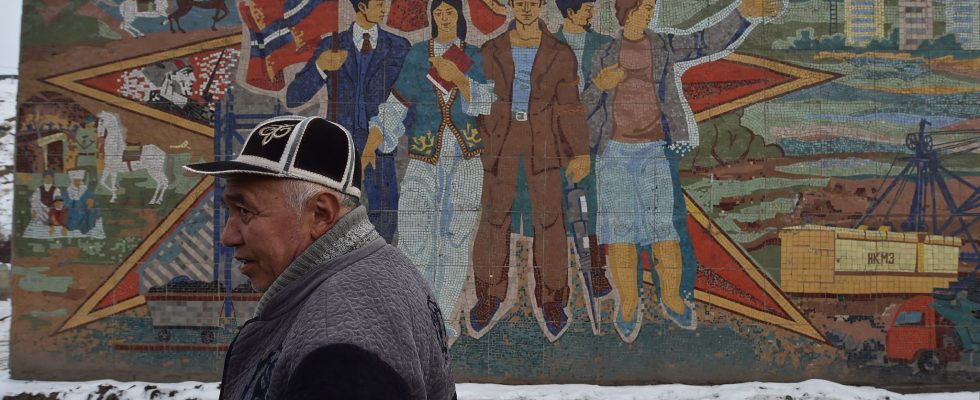Morgenshtern, Russian rapper with texts committed against the war in Ukraine; rock bands Bi-2 or even Pornofilm: all have the common point of having been qualified as “foreign agents” in Russia, but also of having seen their concerts being canceled last month in Kyrgyzstan.
This former Soviet republic seems to want to imitate the implacable legislation on dissidents that Russia has adopted. Kyrgyz deputies are currently discussing the adoption of their own law on foreign agents: this would list on a special register non-commercial organizations benefiting from international funding, as in Russia since 2012. And if their activities are deemed undesirable by the authorities, they will become banned and participants could be punished with 10 years in prison, four years longer than in Russia.
“It’s a cannibal law”, single Akmat Agoulachev, spokesperson for the NGO Media Policy and worried about the future of his organization and the country’s civil society. “Why others organizations would be admitted, and others not? Everything will depend on the goodwill of the authorities.”
Press freedom under attack
In this month of June, the law is supported by nearly a third of the deputies. A Georgian scenario, as last March, when demonstrations took place in Tbilisi against a similar bill, seems impossible in Kyrgyzstan, as civil society is “discouraged by the mass arrests at the slightest gathering of the latter months,” sighs Emil Joroyev, a Kyrgyz political scientist. “They see what happened last October”, continues this observer, referring to the arrest of around thirty activists who demonstrated peacefully against the decision to hand over a tank to Uzbekistan. They are still awaiting trial and each risk between 5 and 10 years in prison.
The power also intends to trim the freedom of the press, with another proposed law copied from Russian legislation, that on “false information”, which would allow the censorship of content if it is deemed “inaccurate”. Last April, the Kyrgyz branch of the American media Radio Free Europe/Radio Liberty, one of the most popular news sites in Kyrgyzstan, was forced to close after a lengthy trial. A regression which has caused the country to lose 50 places this year (to 122nd) in the Reporters Without Borders ranking.
Authoritarian consolidation
Repressions are increasing in a country that has long been considered a “democratic island” in Central Asia. A small republic of 7 million inhabitants wedged between Uzbekistan, Tajikistan, Kazakhstan and China, Kyrgyzstan has for years been an exception between neighbors with authoritarian or dynastic regimes, thanks to its developed civil society, a certain political pluralism and relative freedom of expression. Since its independence in 1991, the country has experienced three revolutions and six presidents, which have established the beginnings of a parliamentary regime.
But in recent years, freedoms have continued to decline. “The last three presidents have in turn dismantled the democratic system. Today we are at the stage of the authoritarian consolidation of the regime”, explains Edward Lemon, professor at the University of Texas and specialist in post-authoritarian regimes. Soviets. Since 2021, Kyrgyzstan has been classified as an authoritarian regime in various world rankings, following the coming to power of the current populist President Sadyr Japarov.
The one who wants to be a “man of the people” was released from prison by his supporters in the chaos of the 2020 revolution. Accused of having organized the hostage-taking of a senior official, he had been imprisoned since 2017. “In a paranoid attitude, he now fears uprisings against him,” points out Emil Joroev. This is why, since his release, he has restricted civil liberties, supported by his right-hand man Kamtchymbek Tachïev, head of national security and one of the most powerful men in the country”. As a result, “he has annihilated any movement of political opposition, institutional or not”, notes Dastan Bekeshev, deputy to the Parliament.
Alignment with Russia
On May 9, the day of the military parade in commemoration of the Second World War in Russia, Sadyr Japarov was among the few autocratic presidents present alongside Vladimir Putin. “The Russian president represents a real model of authoritarian government for him”, underlines Edward Lemon.
Russian influence on the Kyrgyz elite has only grown since the start of the war in Ukraine. “As we are part of the Eurasian Economic Community and many Kyrgyz migrants go to work in Russia, we have become hostages of isolated Russia and its politics,” sighs Akmat Agoulachev, of the NGO Media Policy.
In addition to Russian dissident singers, Kyrgyzstan has banned pro-Ukraine rallies in the capital Bishkek, despite the country saying it has a neutral stance on the war. In early June, authorities arrested and deported to Russia three Russian anti-war activists who were tracked using Chinese surveillance systems. A Russian emigrant in Kyrgyzstan then launched this call on Twitter: “Do not come to Kyrgyzstan, especially if you have a problem with Russia.”
